Free Berlin
A free newspaper on the politics of creative life
The paper aims to contend with current debates on the creative city and how creative workers contribute to the cultural value of Berlin. With the intensification of “the Berlin phenomenon” this cultural value both fuels an extremely dynamic social milieu while lending to a political and economic apparatus of uneven urban development. In addition, the urban and social conditions that make possible such creative freedoms confront new limitations in the face of contemporary forms of illiberalism. While Berlin has historically functioned as a zone of diversity and tolerance, what new modalities of civic practices are needed today?
The publication was launched in 2015, and after eight years presented its tenth and final issue in 2023. We're glad to share the archive below. And will continue to keep open to revisiting the project in the future.
See all issues below
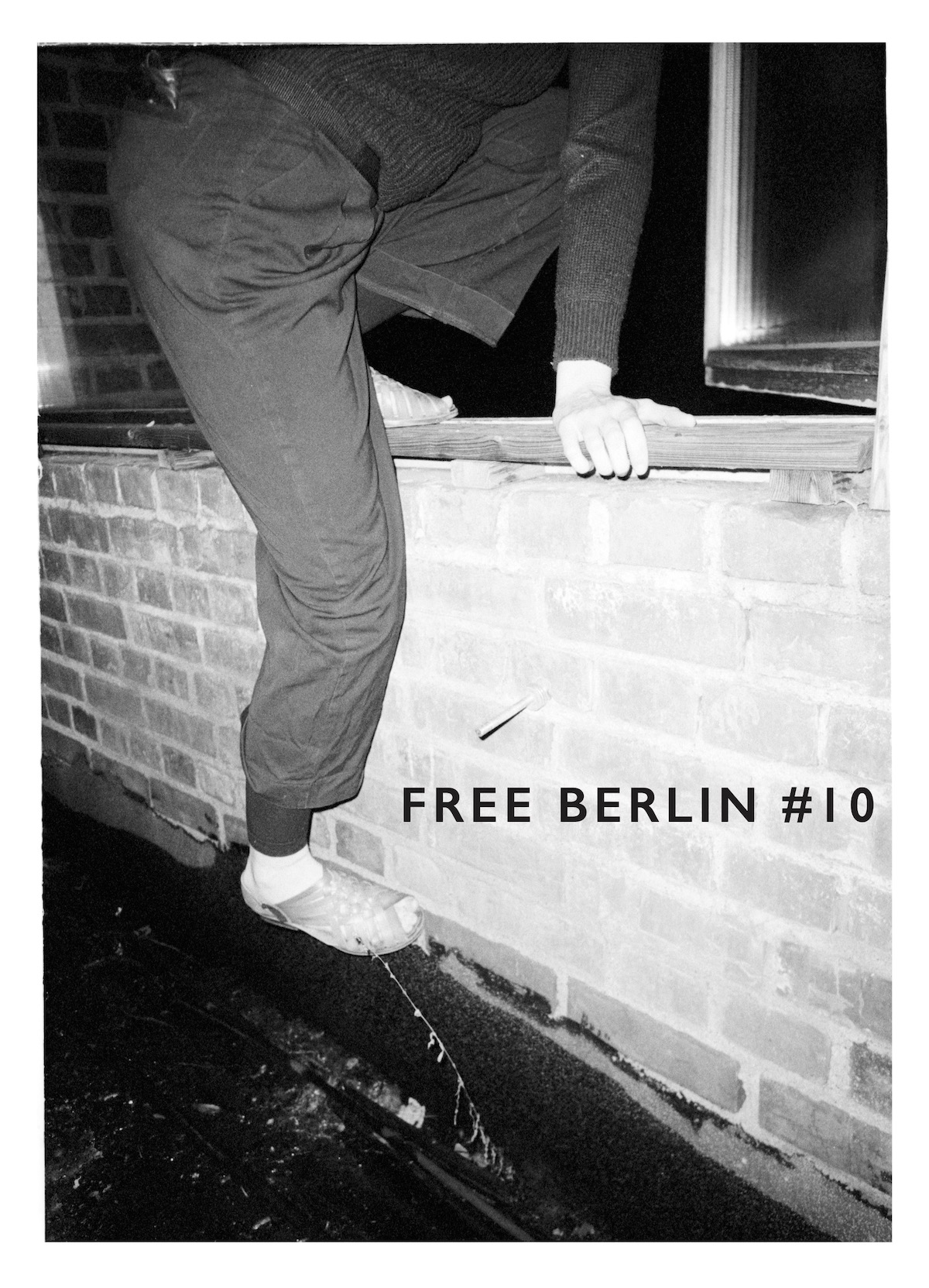
Free Berlin – free newspaper, free culture, free ideas
Issue No. 10 / June 2023
With contributions by: Elena Loizidou, Isabelle Fremeaux & Jay Jordan, Adam Kraft, Anaïs Florin, Kari Anne Drangsland, Jesko Fezer, Andrea Mineo, Organisms Democracy, with additional contribution by Mijo Miquel.
The tenth issue of Free Berlin developed in dialogue with the exhibition Power Space Violence: Planning and Building under National Socialism, Akademie der Künste, Berlin, and launched as part of the exhibition Event program, June 2023.
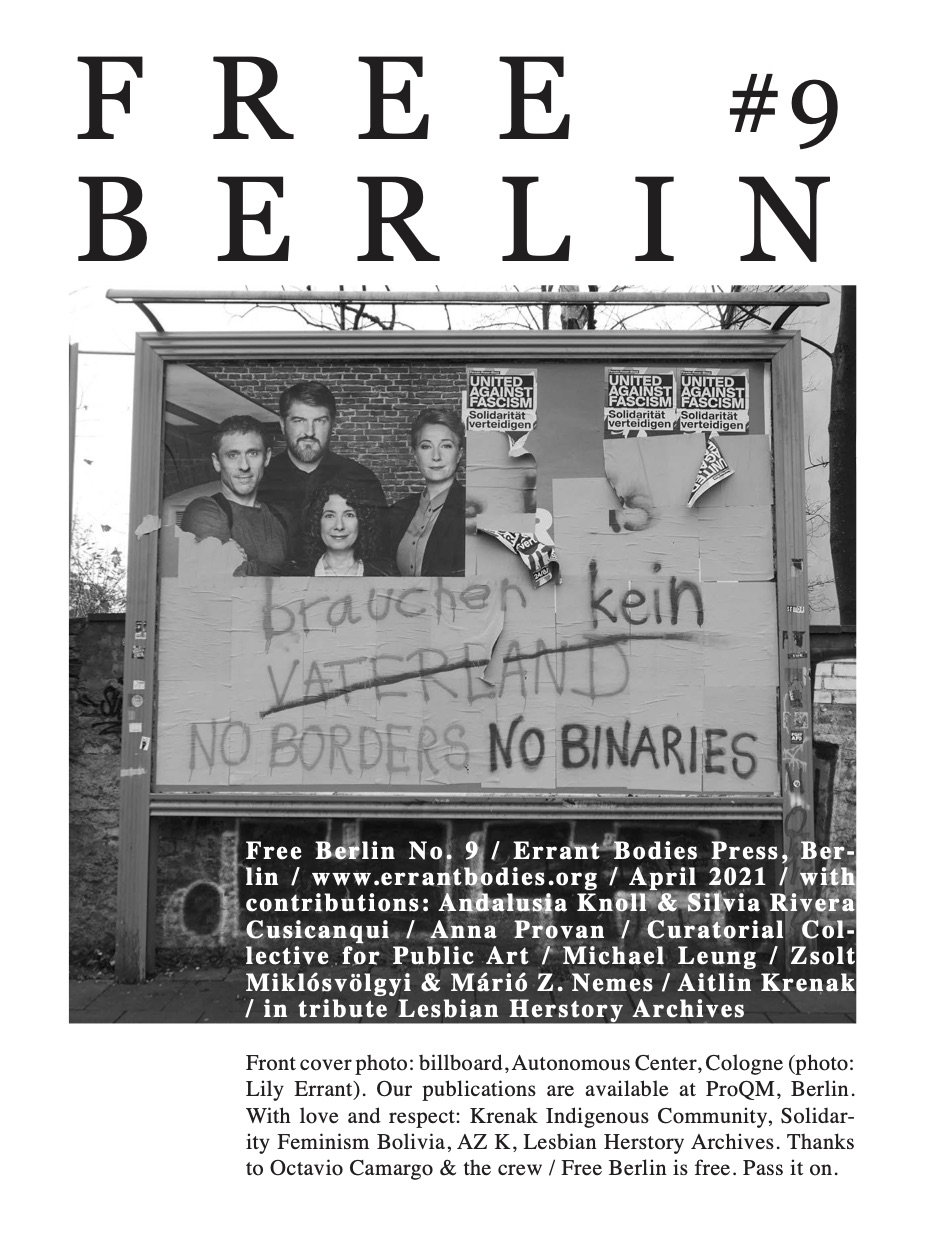
Free Berlin – free newspaper, free culture, free ideas
Issue No. 9 / April 2021
With contributions by: Andalusia Knoll & Silvia Rivera Cusicanqui / Anna Provan / Curatorial Collective for Public Art / Michael Leung / Zsolt Miklósvölgyi & Márió Z. Nemes / Aitlin Krenak / in tribute Lesbian Herstory Archives
The ninth issue of Free Berlin brings together a range of international voices in reflecting upon the contemporary social and political environment. Including an interview with Bolivian feminist activist Silvia Rivera Cusicanqui highlighting dynamic intersections across Indigenous and anarchist thought and practices; in conjunction with a transcription of a speech made by Indigenous leader Aitlin Krenak to the Constitutional Assembly in Brasilia in 1987 during the drafting of the new constitution, a reflection on South American Indigenous struggles and strengths is brought forward. This is complemented by Anna Provan’s exposé on the Centre for Feminist Foreign Policy, an advocacy organization spearheading feminist interventions within the culture of foreign policy making often shaped by militaristic and masculinist perspectives. Michael Leung, a researcher and urban agricultural activist based in Hong Kong, reports on current struggles in the city around urban development projects that are eradicating long-standing village communities. Leung poignantly reminds of the importance of honoring the deep social fabric and rootedness of community life. Such views find a provocative intensity through the work of Zsolt Miklósvölgyi & Márió Z. Nemes, key figures in the Hungarofuturism project. Responding to the ongoing nationalistic project of the Orbán government, Hungarofuturism aims to intervene by capturing alternative narratives. Questions of city life, and what constitutes our communal efforts, is finally given beautiful articulation in the work of the Curatorial Collective for Public Art. They offer documentation of their initiative, This Is An Intervention! staged in Berlin summer of 2020 in response to the Corona-crisis. Through a series of artistic interventions across the neighborhood of Kreuzberg, the project asks visitors to slow down, and to dwell upon the questions and uncertainties prompted by lockdown. Are there new lessons and opportunities to be found? New reflections and ways of practicing to be invented?
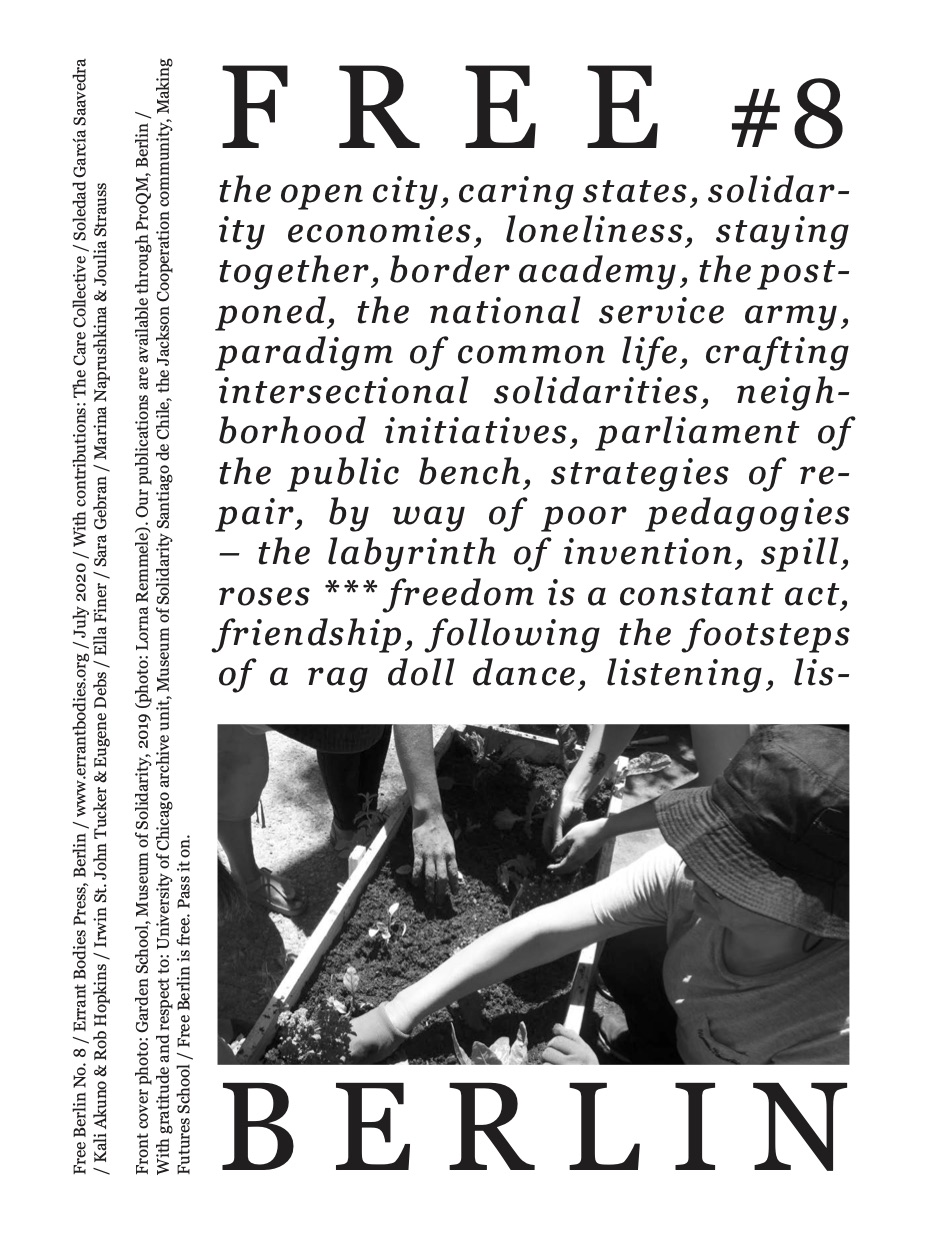
Free Berlin – free newspaper, free culture, free ideas
Issue No. 8 / July 2020
With contributions by: The Care Collective / Kali Akuno & Rob Hopkins / Soledad García Saavedra / Irwin St. John Tucker & Eugene V. Debs / Ella Finer / Sara Gebran / Marina Naprushkina and Joulia Strauss
The eighth issue of Free Berlin draws together a range of voices and positions gravitating around issues of care and solidarity, both from personal and institutional perspectives. This includes The Care Manifesto, authored by the Care Collective, a collective of thinkers and activists responding to our contemporary crises by arguing for a more care-oriented economy and system of governance. Such views find a point of reference in Cooperation Jackson, an initiative in Jackson, Mississippi, aimed at nurturing a grass-roots, citizen-led coalition within local African-American communities. In an interview with Kali Akuno, we discover the larger social and political framework of the Cooperation, and importantly, the plan for establishing a solidarity economy in support of the community. Cooperation Jackson becomes an inspiring example of the ways in which care and solidarity become pillars within institution building. Furthering such perspectives, Soledad García Saavedra, curator of public programs at the Museum of Solidarity in Santiago de Chile, offers an important insight into the Museum’s history as well as their current programs. Within the recent movements against economic disparity and political elitism, the Museum has reworked its directive towards engaging with the local neighborhood of República, which as Soledad reveals, has led to new understandings about the function of an art institution by bringing the Museum onto the streets. A project by Berlin-based artists Marina Naprushkina and Joulia Strauss offer another inspiring example of just such an act: their Economy of Borders acts as a poster-art-campaign in support of women refugees living in Greece. Draped across the façade of the city hall building in Moabit, Berlin, their public exhibition forms the backdrop to an ongoing assembly taking place over the summer, bringing the issue of border struggles out in the open. Such concerns are given a historical reference in the presentation of writings by the socialist activists Irwin St. John Tucker and Eugene V. Debs, whose labor battles in America in the early 20th century still stands as an important example for addressing care and solidarity. Bringing art onto the streets, working at care and solidarity economies, the issue of Free Berlin also turns to more personal accounts. Sara Gebran, an artist and writer working in Lisbon, shares excerpts from her current writing project, which appears as a diary kept since beginning self-quarantine in March in Copenhagen. Her diary gives insight into the more individual, psychological and emotional experiences of what it means to encounter a state of lockdown. This finds resonance in Ella Finer’s article, which reflects upon the crisis by listening: listening to others and her environment, Finer suggests that attuning by way of the acoustic may assist in staying close to the interdependent bonds of common life.
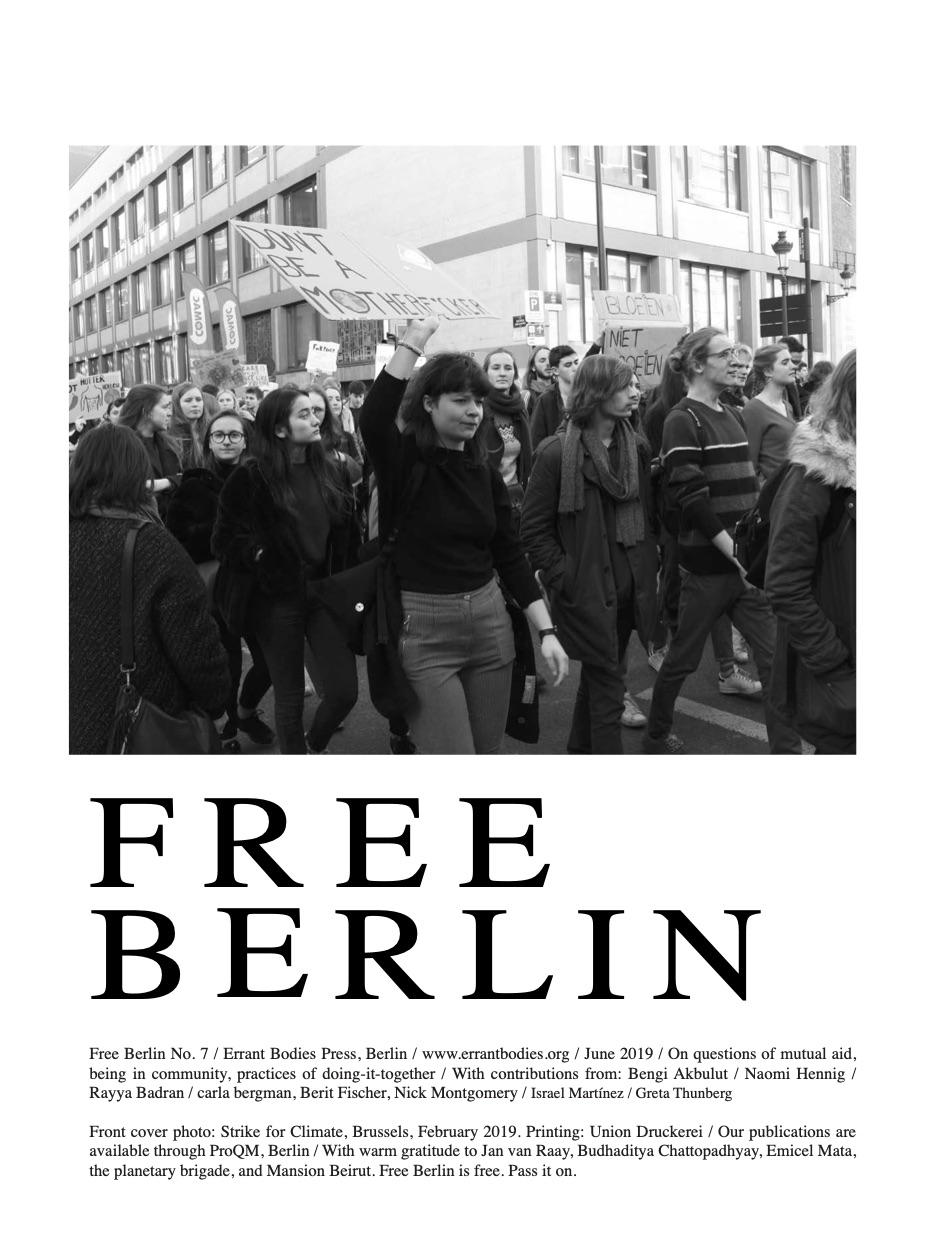
Free Berlin – free newspaper, free culture, free ideas
Issue No. 7 / June 2019
With contributions by:
Bengi Akbulut / Carla Bergman, Berit Fischer, Nick Montgomery / Israel Martínez / Naomi Hennig / Rayya Badran / Greta Thunberg
The seventh issue of Free Berlin considers the project of mutual aid and follows a number of critical and creative expressions in diverse locations. This includes documentation of an ongoing series of interventions by the artist Israel Martínez. Emerging in response to the earthquake in 2017 in Mexico City and the outpouring of social solidarities passing between strangers and neighbors, Martínez attempts to prolong this new social sensibility through a range of artistic works and gestures. In doing so, Martínez underscores mutual aid as what may foster emergent informal networks bypassing state structures, especially when they fail to give support. We find parallel expressions in the work of Berit Fischer and her Radical Empathy Lab. Through a conversation with authors and activists carla bergman and Nick Montgomery, whose book Joyful Militancy maps out an important set of perspectives on the work of mutual aid, questions of response-ability, trust and intimacy are brought forward as central to how mutual aid may enrich our capacities to compose life together. Rayya Badran, a researcher from Beirut, offers an insightful view onto Mansion, an independent art center and studio collective in the city running since 2012. Leading us through the potentialities and challenges around sustaining independent cultural spaces in Beirut, Badran further highlights how mutual aid is as much about “ontologically organizing” (Papadopoulos) as it is about sharing in the day-to-day practicalities of collective space. Questions of alternative economies, ethical responsibility, and transparent governance emerge through these examples, which are brought into a greater philosophical framework in the essay by Bengi Akbulut. Mapping the question of commons, along with practices of commoning, Akbulut offers an important understanding on what is at stake in commons, emphasizing “social ecology” as the means by which commoning may proliferate. The issue of commons has gained much traction within contemporary art, leading to the question of how commons can withstand the biocapitalistic drive embedded in a contemporary art field that seems to even profit from attempts at exit. Naomi Hennig gives an engaging reflection on the history of the art strike; from Gustav Metzger to Lee Lozano, and more recently, to the Human Strike posed by Claire Fontaine, the ways in which withdrawal and striking can perform as an artistic act is brought into question, reminding us of the never-ending challenges around the work of “aesthetic resistance”.
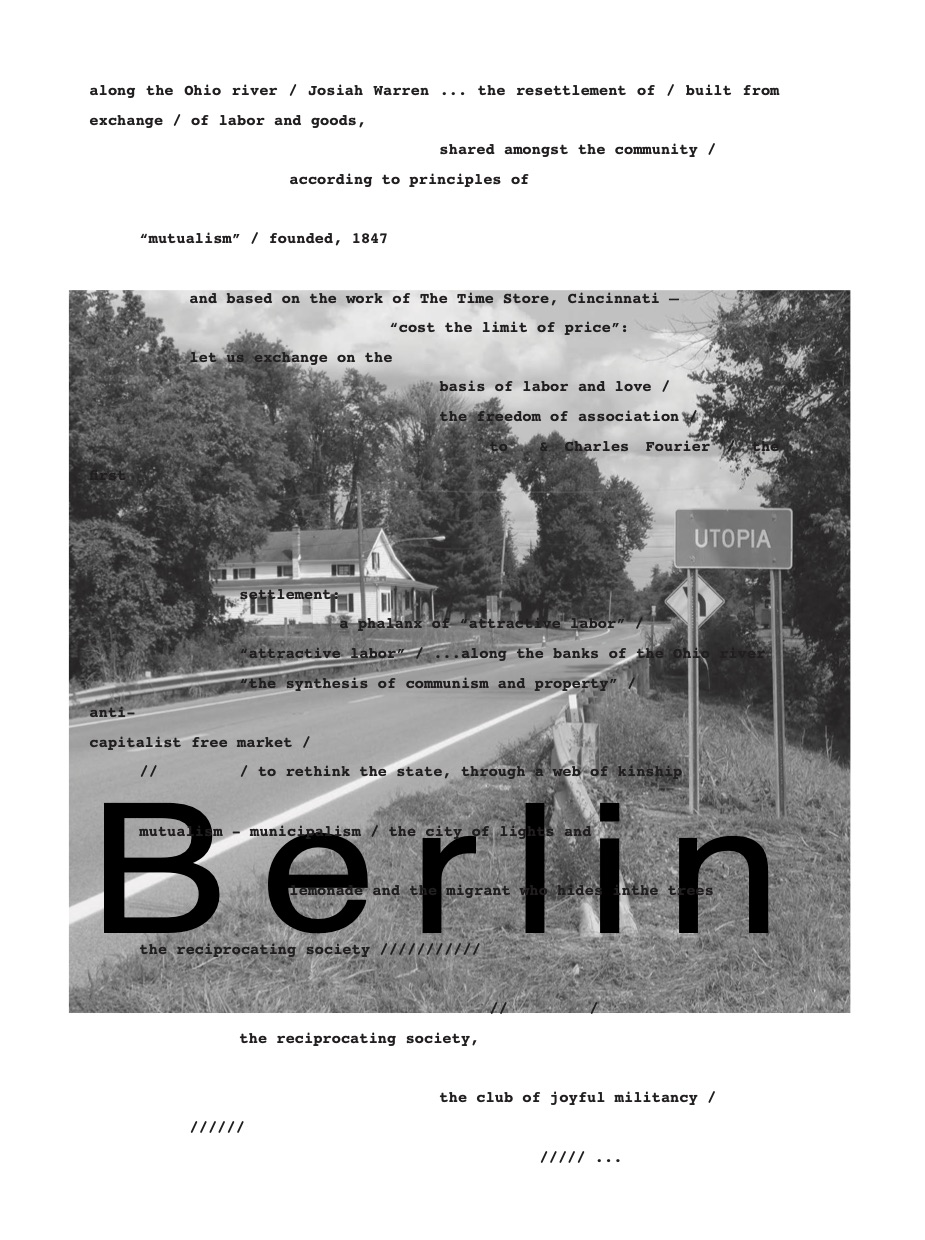
Free Berlin – free newspaper, free culture, free ideas
Issue No. 6 / September 2018
With contributions by:
Frans Jacobi / Valentina Montero / Jelena Petrovic´ / Golo Föllmer and Georg Klein / Galal El-Behairy / Josiah Warren Archive
The sixth issue of Free Berlin takes stock of utopian and dystopian thinking, examining particular histories of artistic resistances as well as expressions of communalization and cultural organizing. From Valentina Montero’s detailed account of poetic resistance in Chile since the 1970s to Jelena Petrovic´’s critical engagement with “the politics of error”, key perspectives on cultural autonomy and solidarity are presented. This is furthered in the interview with Golo Föllmer and Georg Klein, co-curators of the recent Dystopia sound art festival presented in Berlin. As they highlight, utopia and dystopia are two sides of the same coin, and capture a rather complex entanglement of fear and hope, control and generosity. The edition also includes material from the Josiah Warren Archive, highlighting Warren’s early experiments in alternative economies and mutualism, as well as a poetic manifesto by the Egyptian poet Galal El-Behairy, whose imprisonment in Cairo this year bleakly reveals the ongoing plight of revolutionary struggle in the country. Finally, the artist Frans Jacobi reflects upon his recent journey to Albania; through a diaristic account of encounters and discoveries, Jacobi offers a thoughtful reflection on art’s relation to politics, reminding us how the cultural imagination performs a necessary antagonism today onto what counts as politics. As Jacobi concludes, “It is time for a different kind of engagement.”
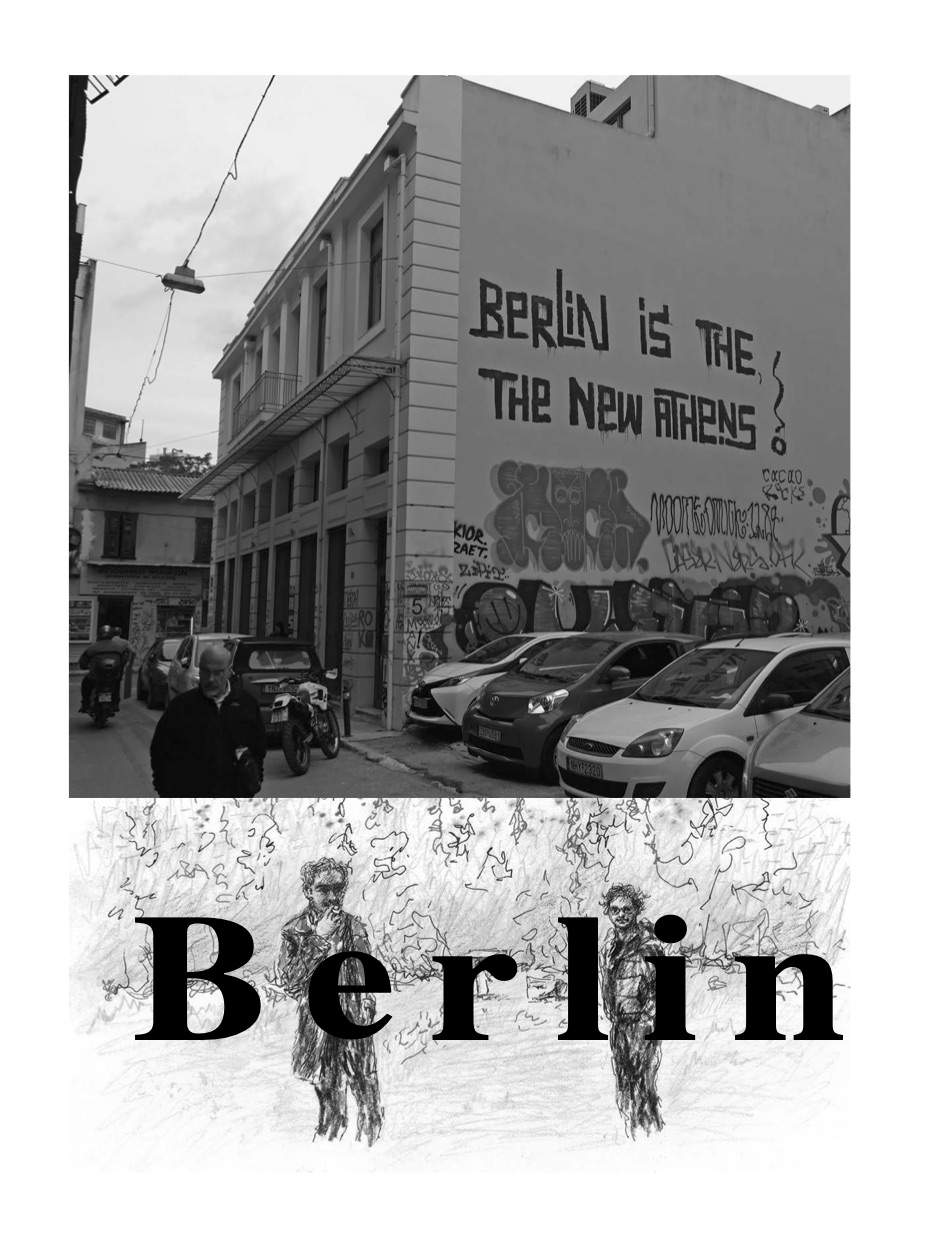
Free Berlin – free newspaper, free culture, free ideas
Issue No. 5 / May 2018
With contributions by:
Eva Rowson / Angela Lammert / Joulia Strauss & Avtonimi Akadimia / Lily Zabrowska / Lise Skou / Tatiana Fiodorva / John Sinclair and the White Panther Party
The fifth issue of Free Berlin includes contributions that focus on histories of underground art and music, as well as practices and projects of hospitality, informal pedagogies, and experimental economies. This includes an interview with the curator Angela Lammert on the exhibition at the Akademie der Künste, Underground and Improvisation, which raises new discussions on eastern European art and culture from 1968 to 1994. The curator and organizer Eva Rowson reflects upon her own activities in running a gallery from her apartment in London, and relates this to a larger history of domestic space being utilised as a stance against cultural hierarchies. Tatiana Fiodorova, an artist and researcher from Moldova, presents a series of drawings made on toilet paper of older women who survive by selling goods at an informal flea market in the city of Chisinau. The Danish artist, Lise Skou, has been running a café in Aarhus in order to draw out critical discussions on the question of hidden economies; by exploring alternative methods of exchange, her work exposes the difficulties in getting out of capitalism as well as the joys found in direct exchange. Finally, Joulia Strauss from Avtonimi Akadimia reports on current urban developments in Athens, and invites participation in the upcoming summer Academy, which continues to foster an international community searching for new approaches to critical discourse and protest. The necessity, despair and creative practices of survival are captured through the collection, and find a final point of reference through Lily Zabrowska’s reworking of the White Panther Party’s program of cultural revolution, leading us to Detroit as a potential site for radical municipalism.
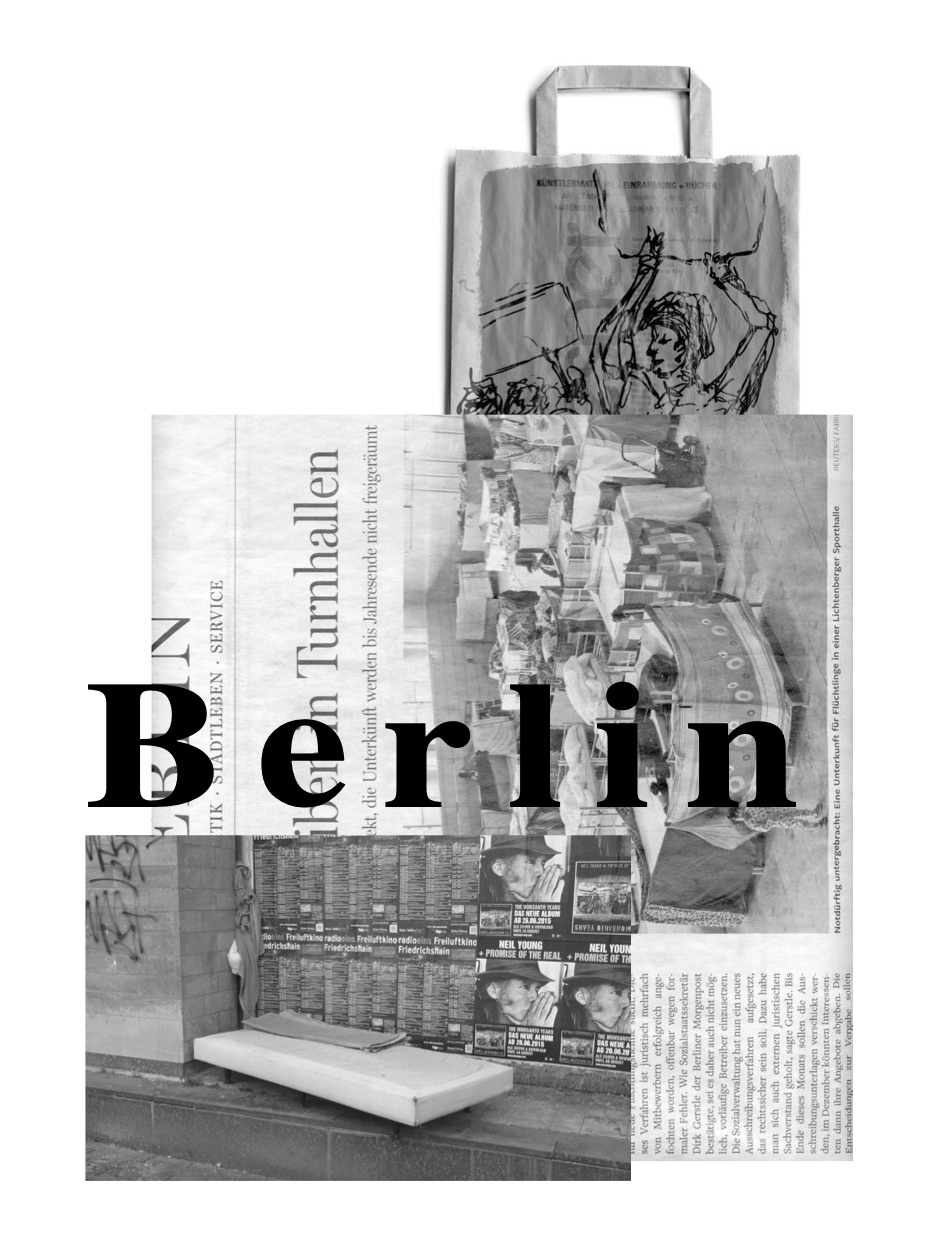
Free Berlin – free newspaper, free culture, free ideas
Issue No. 4 / July 2017
With contributions by:
Christoph Tannert / Dimitris Papadopoulos /
Lily Zabrowska / Allegra Solitude / Lars-Broder Keil / Karolina Dreit, Janine Eisenächer, Aiko Okamoto and Felicita Reuschling / and with respect Franz Jägerstätter and Audre Lorde
The fourth issue of Free Berlin considers such questioning through a number of articles that reflect upon important historical events and cultures. From Reverend Martin Luther King’s visit in 1964 to the East-West divide and its influence upon artists in former East Berlin, for example, the issue highlights particular figures and social formations from which to draw knowledge and inspiration. These articles are complemented by works that address the conditions of cultural practices today, and how creative collaborations and sharing spaces raise questions as to who “benefits” from free culture. Finally, we are invited to speculate on the contemporary emergence of cultures of making, and the possibilities afforded by the new ontology of our social body: the commoning sensibilities that are already making the future of today.
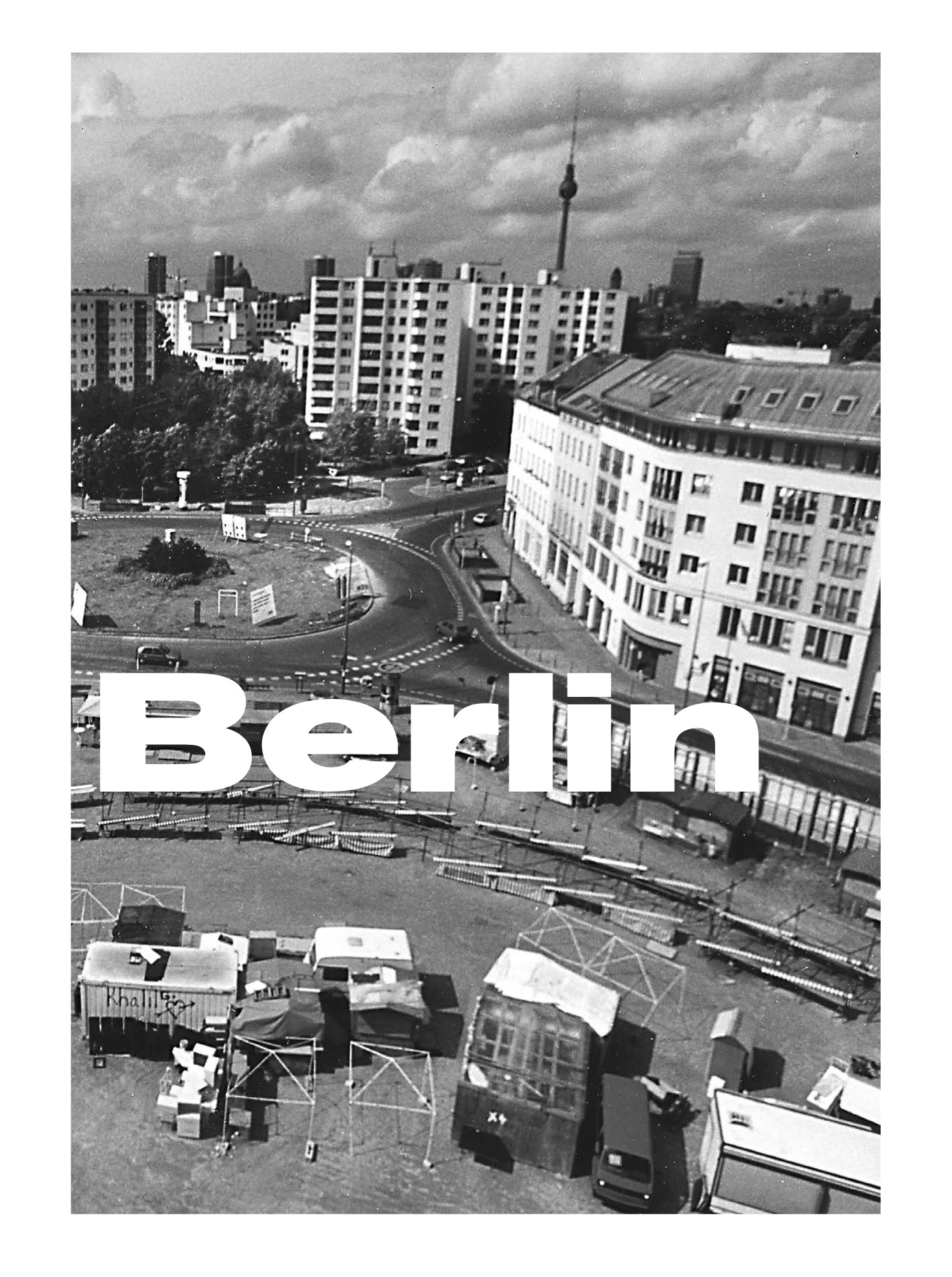
Free Berlin – free newspaper, free culture, free ideas
Issue No. 3
With contributions by Anna Bromley & Sandy Volz, Napuli Langa, Prinzessinengarten, Brandon LaBelle, Kathrin Wildner.
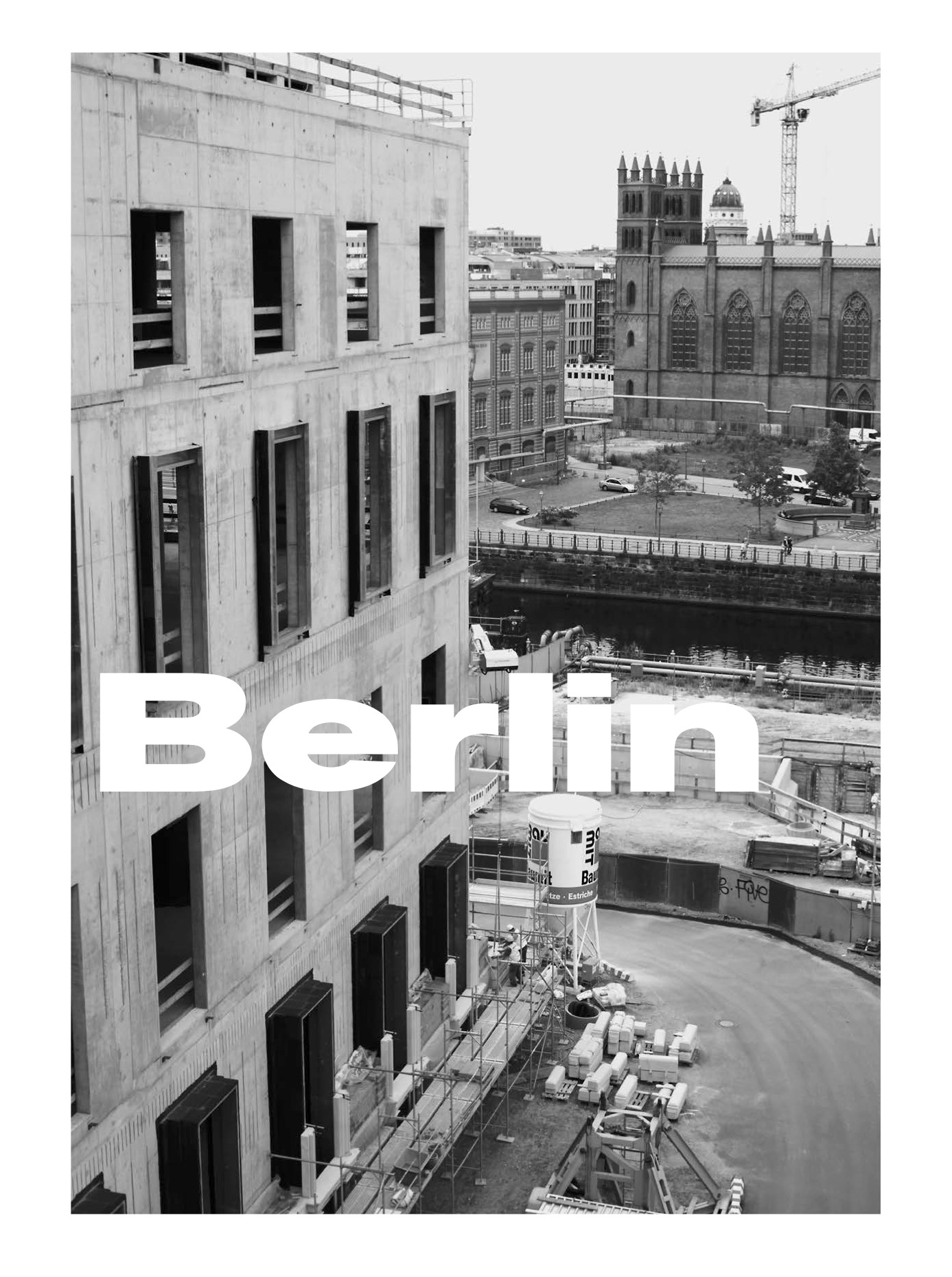
Free Berlin – free newspaper, free culture, free ideas
Issue No. 2
With contributions by Mario Asef, Riccardo Benassi, Alessandra Eramo, Erik Göngrich, Brandon LaBelle, Heimo Lattner / Annette Maechtel, Matteo Pasquinelli, Allegra Solitude.
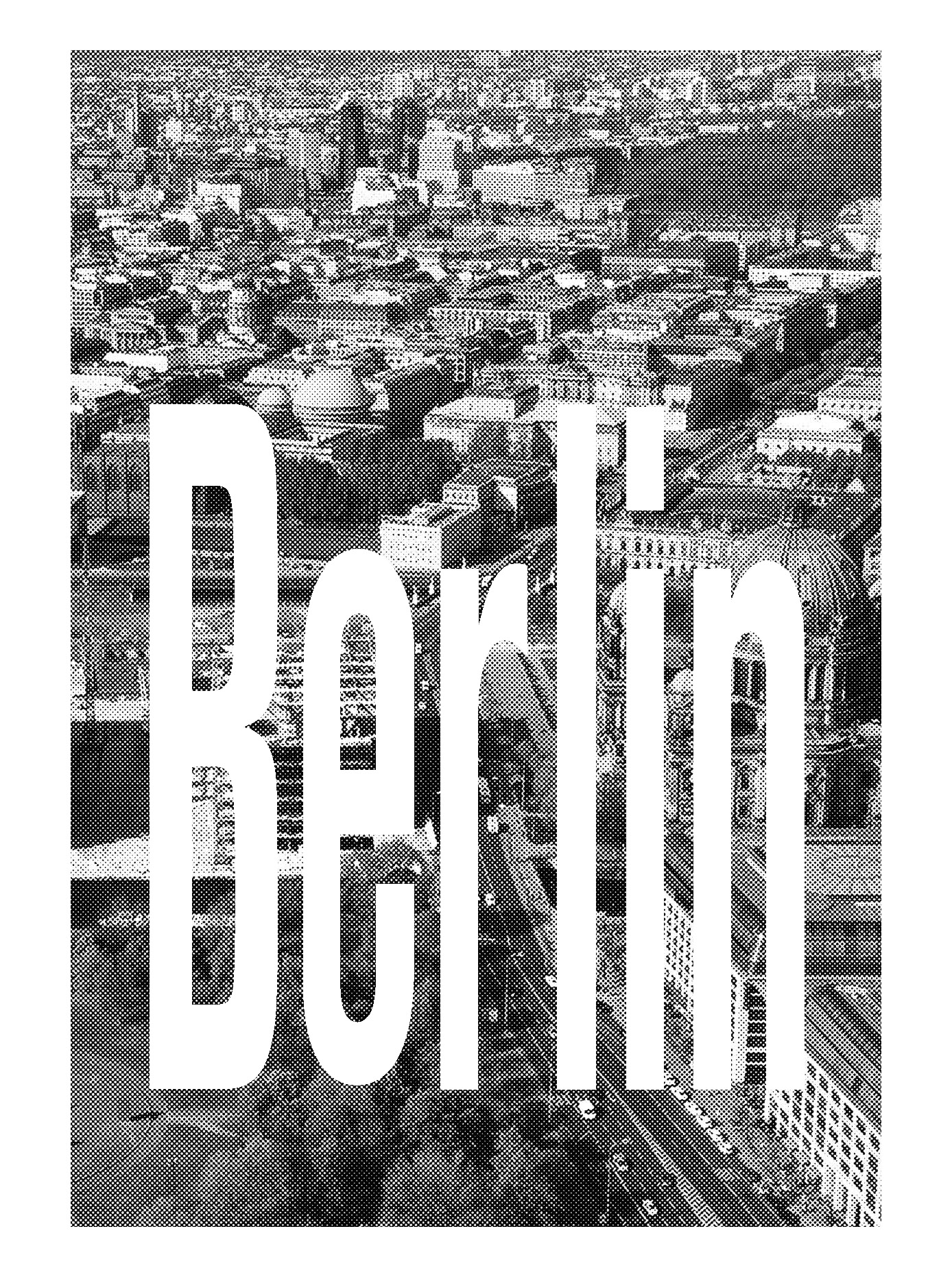
Free Berlin – free newspaper, free culture, free ideas
Issue No. 1
With contributions by Jeremiah Day, Jennifer Davy, Fred Dewey, Erik Göngrich, Brandon LaBelle, Janet Merkel, Marguerite van Sandick, Steffi Weismann.





